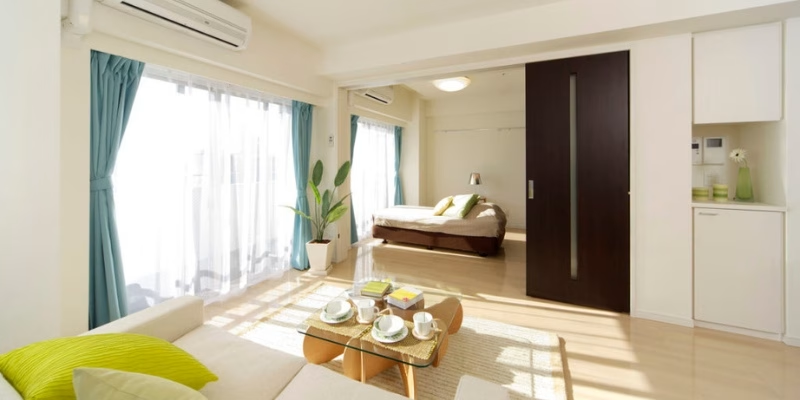Japanese apartment vocabulary is essential for anyone planning to rent an apartment in Japan in 2025. While the experience of finding a home in Japan can be exciting, it also comes with challenges, especially if you’re unfamiliar with local language and real estate terminology. Misunderstandings often arise from contracts, fees, or housing rules, leading to stress and unnecessary costs.
To help you navigate smoothly, this guide introduces all the key terms you’ll need when searching for an apartment in Japan. Whether you’re a student, professional, or long-term resident, mastering these words will save you time, money, and effort during your housing journey.
Overview of Key Japanese Real Estate Terms: Apāto, Manshon, and Fudōsan
Before diving into the rental process, it’s important to understand some basic real estate terminology in Japan:
- Apāto (アパート): Typically a low-rise apartment building made of wood or light materials, often more affordable.
- Manshon (マンション): A condominium or apartment building made of concrete or steel, generally higher quality and more expensive.
- Fudōsan (不動産): Real estate or property, and also used to refer to real estate agencies.
Knowing these words will help you communicate more effectively when searching for apartments or talking to agents.

Why Mastering Japanese Vocabulary Matters When Apartment Hunting
Renting property in Japan involves navigating numerous administrative procedures and preparing various legal documents, which can often feel overwhelming. Therefore, becoming familiar with the specific terminology related to apartments and rental agreements is essential.
When you have a solid grasp of Japanese apartment vocabulary, you’ll be able to accurately interpret rental listings and contract details, minimizing the risk of misunderstandings or costly errors. Moreover, understanding these terms helps you build trust and a good rapport with landlords and real estate agents, making negotiations smoother and more effective.
As a result, the entire rental process becomes more efficient and less stressful, allowing you to secure your ideal home in Japan with greater confidence and ease.

Must-Know Rental Contract Vocabulary in Japan
In Japan, rental agreements include several key terms that tenants should know beforehand. For example:
- Shikikin (敷金): This refers to the security deposit paid upfront, which is typically refundable provided there’s no damage to the property.
- Reikin (礼金): Known as “key money,” this is a non-refundable fee given to the landlord as a gesture of thanks.
- Chūkai Tesūryō (仲介手数料): The agent or brokerage fee, usually equivalent to one month’s rent, paid for the real estate service.
- Kōshiki Keiyaku (契約書): The official lease contract document outlining the terms and conditions of your rental.
- Koyaku (保証人): The guarantor who agrees to cover your rent payments if you are unable to do so.
Familiarizing yourself with these terms will help you navigate the contract signing process smoothly and approach negotiations with confidence.
Apartment Layout & Size: From Tatami to Room Specifications
In Japan, room sizes are commonly described in two ways. Traditional listings may use tatami mats (畳) as a unit of measurement, where one tatami equals roughly 1.62–1.65 square meters, depending on the region. This method is still often used when describing older-style or Japanese-style rooms.
More modern apartments usually rely on abbreviations such as 1K, 1DK, 1LDK, 2LDK, and so on. The number refers to the bedrooms, while the letters describe the shared spaces:
- K = Kitchen
- D = Dining area
- L = Living room
For example, a 1K is a studio with a separate kitchen, while a 1LDK includes one bedroom plus a combined living, dining, and kitchen space. Understanding these labels helps renters choose a layout that matches their lifestyle, whether they prefer compact single living or larger spaces for families.

Application Procedures and Guarantor Requirements
In Japan, securing a rental property usually involves providing a guarantor as part of the application process. Key terms to know include:
- Hoshōgaisha (保証会社): A guarantor company that acts as a third party to guarantee your rent payments.
- Ninshōsho (認証書): Documentation proving your income or employment status.
- Nōken (納賃): The payment of rent itself.
Being familiar with these expressions will help you prepare your rental application accurately and speed up the approval process.
Essential Vocabulary for Daily Life and Utilities
After moving into your new apartment, you’ll come across various terms related to everyday utilities and services, including:
- Denki (電気): Electricity
- Gasu (ガス): Gas
- Mizu (水): Water
- Gomi Shūshū (ゴミ収集): Rubbish collection
- Kōkyō Dōro (公共道路): Public roads or street access
Familiarizing yourself with these words will make it easier to manage your utility bills and communicate effectively with service providers throughout your stay in Japan.
How to Communicate Professionally with Guarantor Companies
During the rental process, guarantor companies might reach out to you. To communicate professionally and make a good impression:
- Begin with polite Japanese greetings like “Hajimemashite” (Nice to meet you).
- Familiarize yourself with common phrases such as “Keiyaku no kettei” (Contract confirmation) and “Shiharai no kakunin” (Payment verification).
- Be ready to submit any required documents promptly and with courtesy.
Using respectful language and understanding these key terms will help smooth interactions and expedite your rental approval.
Tips for Impressing Real Estate Agents
Real estate agents in Japan highly value professionalism, and the way you communicate can strongly influence the quality of properties they introduce to you. One of the best ways to make a good impression is by using the correct Japanese apartment vocabulary during conversations, which shows that you are serious and well-prepared.
It is also important to explain your budget and preferred area clearly so the agent can quickly understand your needs and suggest suitable options. Responding promptly to phone calls and emails demonstrates reliability, while showing respect and politeness during property visits helps establish trust. Agents often prioritize clients who are professional and courteous, meaning that your attitude can directly lead to better rental opportunities and smoother negotiations.

Common Types of Housing and Rental Properties in Japan
In addition to Apāto and Manshon, there are several other popular housing options you might come across:
- Share House (シェアハウス): Shared living spaces that are especially popular among students and young professionals.
- Gaijin House: Apartments designed to be more accessible and foreigner-friendly.
- Guest House: Short-term rental accommodations ideal for temporary stays.
Familiarity with these terms will expand your housing choices and help you find accommodations that best suit your lifestyle.
Knowing the Upfront Fees and Initial Payments
Renting a property in Japan requires preparing for several initial expenses, including:
- Shikikin (Security Deposit): A refundable deposit held to cover any potential damages.
- Reikin (Key Money): A non-refundable payment made to the landlord as a goodwill gesture.
- Chūkai Tesūryō (Agent Fee): The fee paid to the real estate agent, typically equal to one month’s rent.
- First Month’s Rent: Payment for your initial month of living in the apartment.
- Insurance Fee (Hokenryō 保険料): Cost for renter’s insurance to protect your belongings.
Properly budgeting for these fees helps you avoid unexpected financial surprises when moving into your new home.

Negotiation and Flexibility in Rental Agreements
Although rental rules in Japan seem strict, there is some room for negotiation. In many cases, landlords may agree to lower or remove reikin (key money) if the apartment has been vacant. You can also ask agents about reducing fees or including basic appliances.
Standard contracts usually last two years, but some properties offer shorter terms, especially for foreigners. If you show that you are reliable and prepared, landlords and agents are often more willing to adjust conditions. This flexibility can help you save money and find a rental that better matches your needs.
Advice for International Students and Foreign Renters
Renting an apartment in Japan can feel challenging for newcomers, but with the right approach, the process becomes much easier. Here are some practical tips to help international students and foreign renters settle in more smoothly:
- Seek out Gaijin-friendly properties that offer more flexible guarantor requirements.
- Consider living in share houses as a budget-friendly alternative.
- Familiarize yourself with essential Japanese apartment vocabulary to improve communication with landlords and agents.
- Don’t hesitate to request assistance from your university or employer, as many provide support services for housing.
Following these tips can make your rental experience in Japan smoother and more affordable.

Settle into Japan with Ease through Arealty
For many first-time renters, finding housing in Japan can be daunting. Complicated paperwork, guarantor conditions, and language gaps often make the process more stressful than expected. Having a dependable partner to guide you makes everything far smoother.
Why Work with Arealty?
Arealty has long experience in assisting international residents, ensuring that apartment hunting in Japan is straightforward and stress-free. What sets them apart is their:
- Multilingual support – A team ready to assist in English, Japanese, and Vietnamese.
- Proven expertise – Deep understanding of Japan’s rental market and the needs of foreigners.
- End-to-end service – Guidance from property search to contract signing and move-in.
- Transparent process – Clear communication and a customer-focused approach for peace of mind.
With Arealty handling the details, you can start your new life in Japan with confidence. Instead of worrying about housing formalities, you’ll be free to focus on your studies, work, or personal goals.
Hotline: 050-6864-9697
Website: https://arealty.jp
Conclusion
Mastering Japanese apartment vocabulary is essential for a smooth and successful rental experience in Japan. Whether you’re a student, professional, or long-term resident, understanding these terms empowers you to find the right home and avoid rental pitfalls. Prepare yourself with this vocabulary guide before your apartment hunt in 2025 and make your move to Japan stress-free and enjoyable.





Leave a Reply